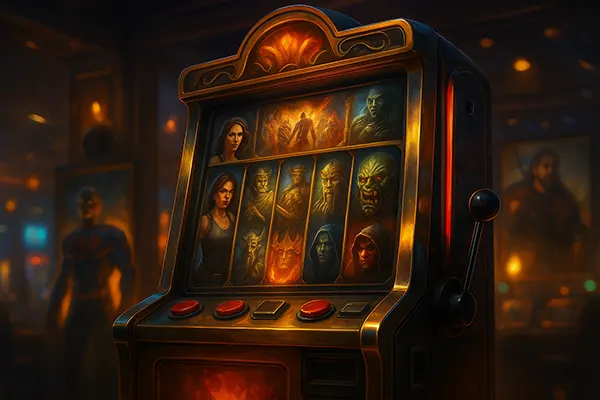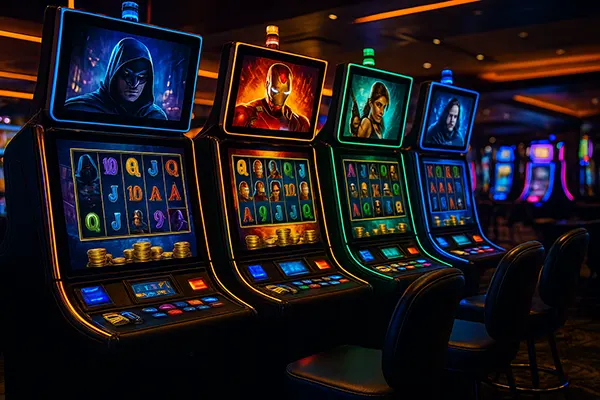
Thematic Slots Based on Films, Series, and Comics: How Licences Shape the Gaming Experience
In recent years, film and comic-inspired slots have become one of the strongest trends in the gambling industry. These games not only attract fans of iconic franchises but also introduce a deeper emotional connection through familiar characters and stories. In 2025, licensed slots remain a key driver for many studios, combining cinematic quality with the excitement of traditional slot mechanics.
The Role of Licensing in Modern Slot Design
Licensing agreements allow game developers to use well-known intellectual properties such as film characters, soundtracks, and settings. This cooperation provides players with an immediate sense of recognition and trust. For instance, when a player encounters a slot based on *Game of Thrones*, they already understand the theme, tone, and expectations — all of which strengthen engagement.
From a technical standpoint, licensed slots require careful balance between visual storytelling and gameplay mechanics. Studios invest heavily in authentic visuals and voiceovers that match the original franchise. These elements add credibility and ensure that fans receive an experience that feels aligned with what they love about the source material.
However, the cost of such licences is significant. Only major developers like Microgaming, Playtech, or NetEnt can afford rights to global franchises. This has raised the industry’s production standards and pushed innovation forward, setting a higher bar for independent creators who must now compete with blockbuster-level slot releases.
Emotional Connection and Immersion
Unlike traditional slots, licensed titles activate a player’s emotional memory. When a player spins the reels of a Tomb Raider slot, the visuals and soundtrack trigger associations with exploration and adventure. This emotional tie enhances player satisfaction, as the outcome of each spin feels like a continuation of a familiar story.
Psychologically, players are more likely to stay engaged when they relate personally to the game’s content. Familiarity with characters and narratives creates a stronger sense of involvement and anticipation. This factor explains why themed slots consistently outperform generic ones in both retention and revenue metrics.
In addition, developers now use narrative-driven bonus rounds and cinematic animations to recreate the excitement of the original media. The combination of nostalgia and interactive storytelling transforms a simple game of chance into an experience that feels cinematic and rewarding on multiple levels.
Successful Examples of Branded Slots
Some of the most successful licensed slots to date include Marvel titles, Game of Thrones, and Jurassic Park. Microgaming’s collaboration with HBO on the Game of Thrones slot was a turning point for narrative slot design, featuring house sigils, theme music, and free spin modes inspired by the show’s characters. Each feature felt purposeful rather than decorative, directly reflecting the series’ competitive nature.
Similarly, Playtech’s The Avengers slot utilised a progressive jackpot system connecting several Marvel-themed games. This networked approach allowed players to experience continuity across different titles while contributing to a shared reward pool. It introduced an early example of how a franchise can be expanded across multiple interconnected slots.
Another memorable case is the Tomb Raider slot by Microgaming, which successfully blended iconic imagery and adventure-driven gameplay. The use of Lara Croft’s character model and soundtrack recreated the thrill of discovery, while the bonus levels mirrored the structure of the video games themselves.
How Storytelling Enhances Replay Value
Storytelling has become a defining feature in modern slot design. When developers integrate narrative progression — such as completing missions, unlocking cutscenes, or collecting symbols tied to a plot — they give players a reason to return. This structure transforms random spins into an episodic journey.
Licensed slots often use episodic rewards to mirror the structure of films and series. Players may “unlock” new scenes or bonuses as they play longer, which reinforces engagement and gives each session a sense of progression. This approach makes the experience more personal and less transactional.
Furthermore, by weaving recognisable story arcs into slot mechanics, studios create emotional pacing similar to that of a film. This balance of tension and reward not only keeps players entertained but also aligns perfectly with the expectations of fans accustomed to high-quality storytelling.

The Future of Licensed Slots in 2025
In 2025, the boundaries between gaming, film, and entertainment are becoming increasingly blurred. Studios now collaborate directly with streaming services and production houses to release slots alongside new movies or series premieres. This synergy creates cross-promotional opportunities that benefit both industries.
Technological progress also plays a crucial role. The rise of 3D graphics, motion capture, and real-time rendering allows developers to deliver licensed slots with unprecedented realism. Players can now interact with characters and environments in ways that feel closer to console gaming than traditional slot play.
At the same time, the growing focus on responsible gambling ensures that entertainment value does not overshadow player safety. Reputable operators and developers in 2025 are integrating time reminders, spending limits, and transparent RTP information — all while maintaining the immersive qualities that fans of licensed content expect.
Licences as a Standard of Quality
Licences now serve not only as a marketing tool but also as an indicator of credibility. A studio that secures rights from major entertainment brands demonstrates both financial stability and creative expertise. This trust factor encourages players to choose licensed slots over unknown alternatives.
Moreover, the collaboration between entertainment giants and developers leads to better compliance with international regulations. Licensed games typically undergo stricter audits to protect brand reputation, which translates into fairer and more transparent gameplay for users.
Ultimately, the success of film, series, and comic-themed slots in 2025 lies in their ability to merge entertainment with authenticity. They stand as proof that when storytelling and technology meet under the umbrella of a trusted licence, the result is not only engaging but also genuinely meaningful for players.
